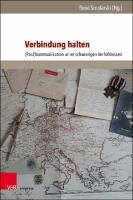Verbindung halten
(Post)kommunikation unter schwierigen Verhältnissen (Edition 1)
Author(s)
Borbach, Christoph
Fomenko, Maksim
Soch, Konstanze
Dreecke, Amelie
Methfessel, Christian
Geissler, Stefan
Smolarski, René
Prass, Reiner
Wewer, Heinz
Contributor(s)
Smolarski, René (editor)
Collection
Knowledge Unlatched (KU)Language
GermanAbstract
1982 stellte der damalige Bundespostminister Kurt Gscheidle in einem Porträt über die Bundespost fest, dass die Post zwar lebensnotwendig, doch für die meisten Menschen uninteressant sei. Diese Feststellung lässt sich auch auf das bisherige Interesse der Geschichtswissenschaft an diesem Thema übertragen. Viele Analysen zur Postgeschichte stammen vor allem aus der außeruniversitären Philatelie. In der Geschichtswissenschaft gelten Philatelie und Postgeschichte hingegen als randständig. Dieser Band betrachtet die besondere Bedeutung der Post(kommunikation) aus geschichtswissenschaftlicher Perspektive. Denn mit der Post, so auch Gscheidle, hätten doch fast alle Bürgerinnen und Bürger jeden Tag zu tun. Das hochkomplexe Konstrukt Post würden die Leute jedoch nur wahrnehmen, wenn es mit all seinen Wechselbeziehungen in seiner Funktion gestört wäre.
In 1982, the former Federal Minister of Postal Services, Kurt Gscheidle, stated in a portrait of the Deutsche Bundespost that the postal service was vital, but of no interest to most people. This observation can also be applied to the interest of historical scholarship in this subject. It is therefore not surprising that many analyses of postal history come primarily from non-university philately. In historical studies, on the other hand, philately and postal history are considered marginal. This is particularly astonishing, as post (communication) has a special significance in history. Because, according to Gscheidle, almost all citizens have to deal with the post every day. However, people would only notice the highly complex construct of the postal service if its function were disturbed.
Keywords
History; WorldDOI
10.14220/9783737012287ISBN
9783737012287Publisher
BrillPublisher website
https://brill.com/Publication date and place
2020Grantor
Imprint
Vandenhoeck & RuprechtClassification
General and world history


 Download
Download